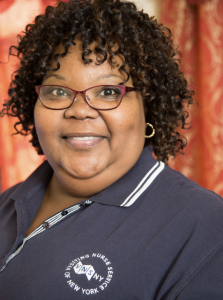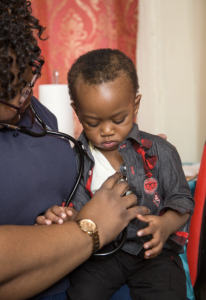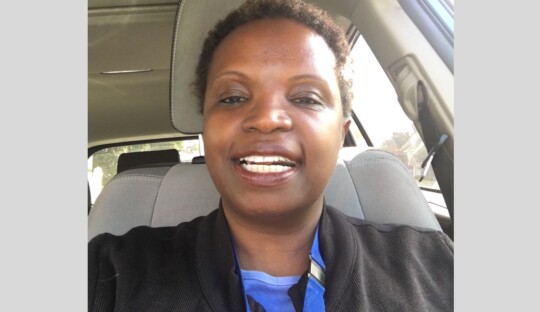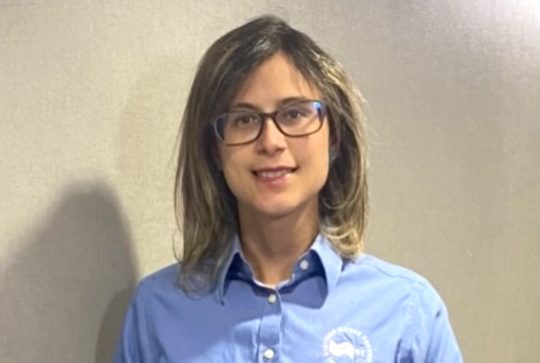Helping Parents “Get it Right”: Spotlight on MNP Nurse Gwendolyn Downs
 Gwendolyn Downs says that the best advice she ever got was from her first manager at the Visiting Nurse Service of New York: If you get it right the first time, you’ll never have to second-guess what you do. “It’s advice that I’ve lived by ever since, and I instill it into everybody that I train—from parents to the nurses I precept,” adds Gwendolyn, who has been a dedicated public health nurse with VNSNY’s Maternity-Newborn Pediatrics (MNP) program for more than two decades.
Gwendolyn Downs says that the best advice she ever got was from her first manager at the Visiting Nurse Service of New York: If you get it right the first time, you’ll never have to second-guess what you do. “It’s advice that I’ve lived by ever since, and I instill it into everybody that I train—from parents to the nurses I precept,” adds Gwendolyn, who has been a dedicated public health nurse with VNSNY’s Maternity-Newborn Pediatrics (MNP) program for more than two decades.
Because the MNP program is family-focused, patient care often includes non-medical challenges. “We have a lot of other issues going on like parents going back to work or to court, and other children that need to be carted off to school, so we assist them with social issues too,” says Gwendolyn. She often arranges social-work visits for clients, and will advocate for them in other ways as well—for example, filing reports for additional services if needed. “My social worker and I piggyback off each other,” she says. “For instance, I used to be president of my kids’ school district when they were in middle school, so I know how to work the system when the Board of Education is involved.”
 Gwendolyn’s patient population includes newborns and children up to 18 years of age, as well as pre- and postpartum women whose conditions can run the gamut from gestational diabetes, hypertension, severe preeclampsia, and cholecystitis to C-section care. “Referrals usually come in for the mother and the baby together, so we do a full head-to-toe assessment of both of them and treat them as a family unit,” she explains.
Gwendolyn’s patient population includes newborns and children up to 18 years of age, as well as pre- and postpartum women whose conditions can run the gamut from gestational diabetes, hypertension, severe preeclampsia, and cholecystitis to C-section care. “Referrals usually come in for the mother and the baby together, so we do a full head-to-toe assessment of both of them and treat them as a family unit,” she explains.
This means that Gwendolyn functions both as a caregiver and teacher. One baby in her care, now six months old, was born premature, weighing just one pound. “She’s been home for two weeks now and is on five different medications for pulmonary hypertension,” notes Gwendolyn. “In addition to assessing and monitoring her for weight gain and feeding, I’m making sure her mom knows how to administer the medications, how to maneuver the syringe to pull up the precise tiny doses needed, and how to store the different meds.”
Gwendolyn tries to always be there, both for her patients and for their other care providers. “Evenings are often the only times doctors can call me before they end their day,” she notes. “If they can take the time, so can I. And I want to be able to talk with them about my patients, so I always pick up.” She also hears from her clients—often long after they’ve been discharged—and welcomes it. “One mom I worked with in the past, whose newborn had some cognitive issues, will occasionally send me updated photos of her child, and it just melts my heart. Sometimes I’ll be in the supermarket and someone will say, ‘Aren’t you Ms. Downs? You might not remember me but you took care of my child years ago!’ It’s so rewarding to know that people remember you and are grateful.”
 One of the challenges that nurses face—particularly pediatric nurses like Gwendolyn—is becoming emotionally attached to a patient. “I was a mommy before I became a nurse, and some patients are going to pull at your heartstrings,” she says. “It can be hard, but you just have to draw the line and remain professional.” She holds a special affection for a one-year-old with neutropenia (reduced white blood cell levels) whom she currently visits three times a week to administer injections that promote white blood cell growth. “He is just the most adorable little boy. He warms up to me, then gets angry at me after I give him an injection. But then he climbs back into my lap and he’s fine.”
One of the challenges that nurses face—particularly pediatric nurses like Gwendolyn—is becoming emotionally attached to a patient. “I was a mommy before I became a nurse, and some patients are going to pull at your heartstrings,” she says. “It can be hard, but you just have to draw the line and remain professional.” She holds a special affection for a one-year-old with neutropenia (reduced white blood cell levels) whom she currently visits three times a week to administer injections that promote white blood cell growth. “He is just the most adorable little boy. He warms up to me, then gets angry at me after I give him an injection. But then he climbs back into my lap and he’s fine.”


